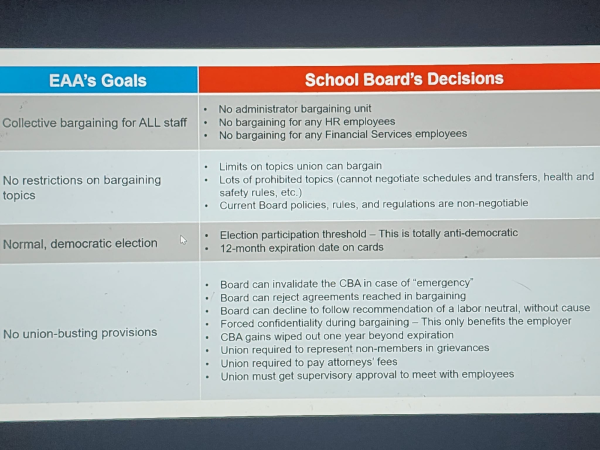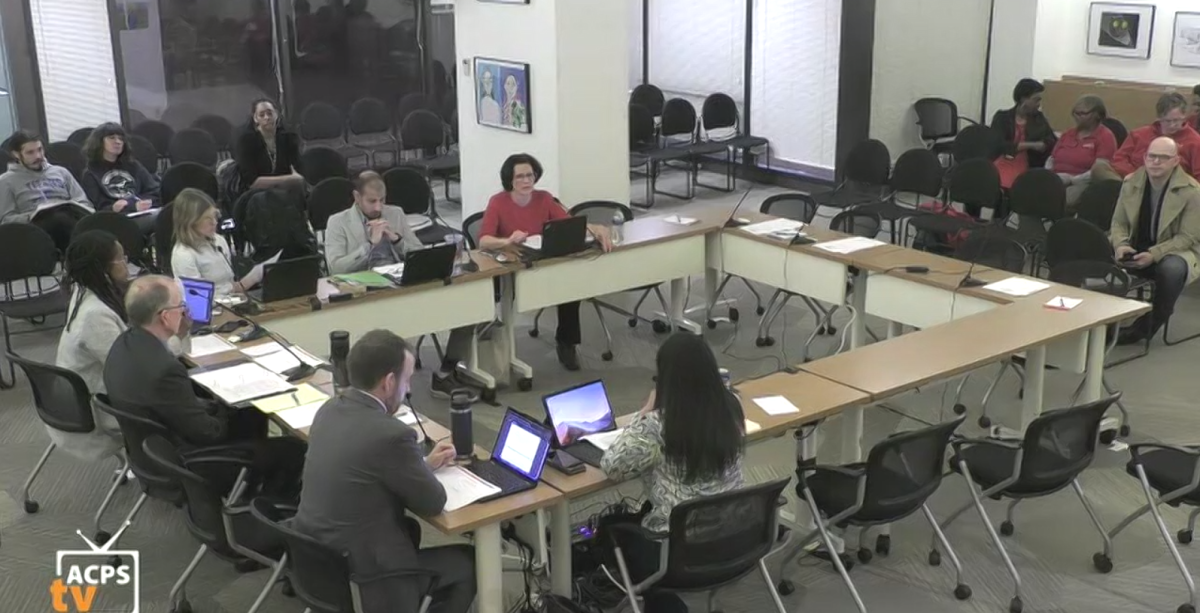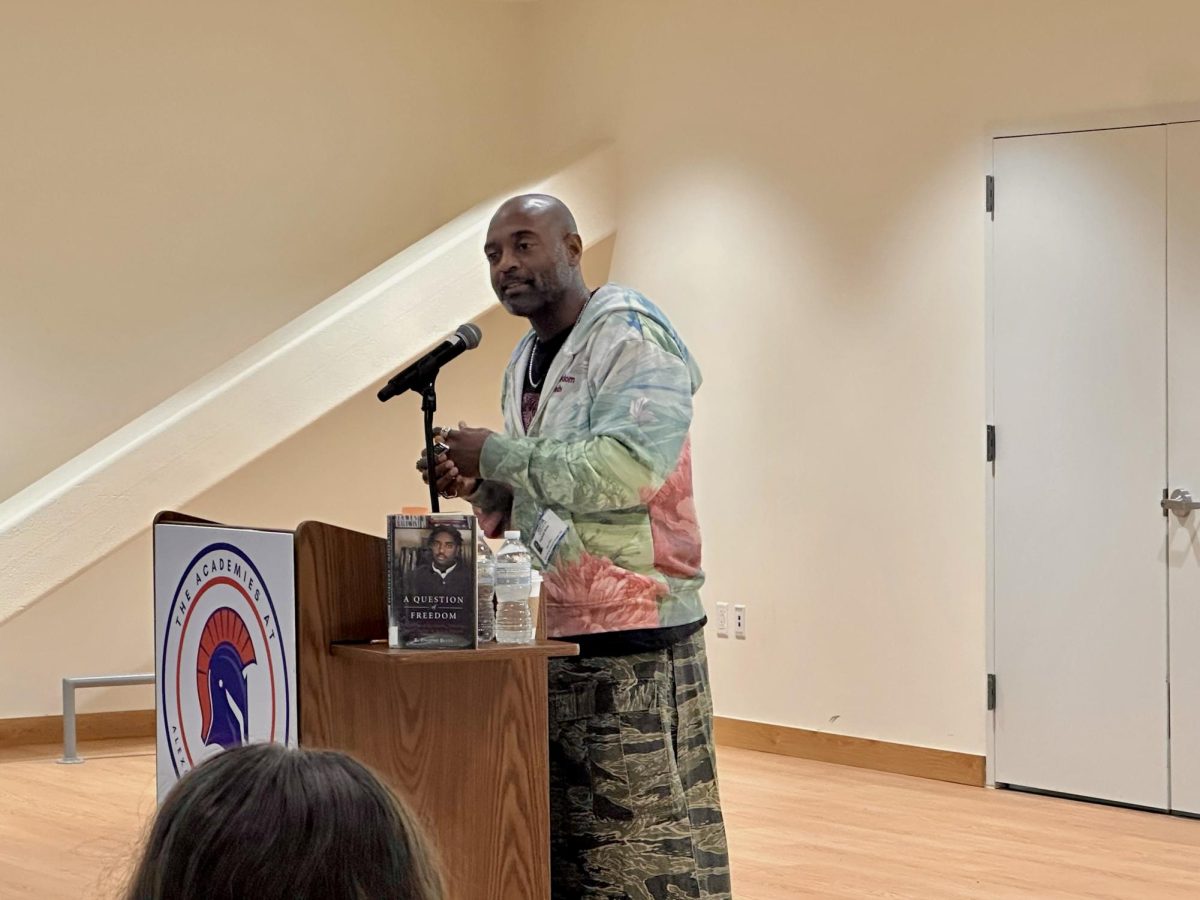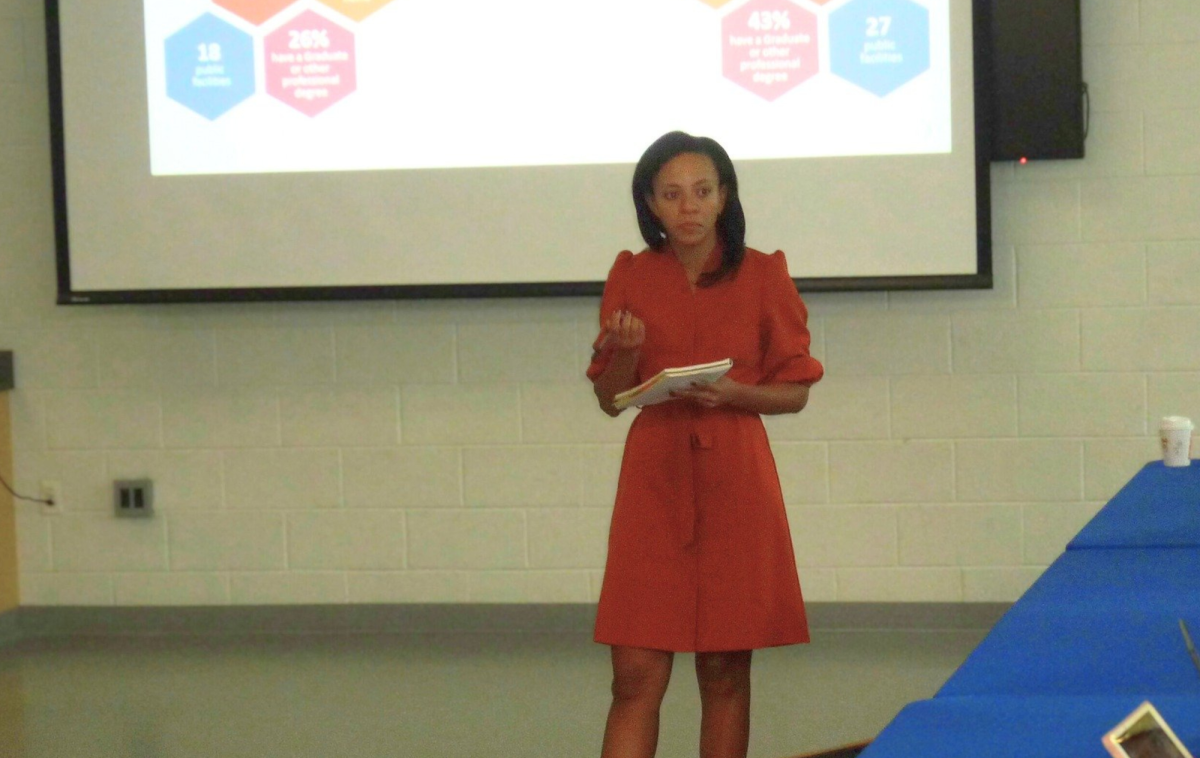At the January 18 public hearing for the next school year’s proposed budget, David Paladin-Fernandez took the final slot for public comment. Wearing a Titan’s Wrestling hoodie — the Jefferson Houston science teacher volunteers as a coach on the ACHS team — he reintroduced himself to the Board.
“Good evening. My name is David Paladin-Fernandez, and this is my fourteenth time advocating for collective bargaining,” he said. “If I asked everyone in this room if our educators deserved more, I have no doubt that every single one of us would say yes. But desire without direction just leads us to doing the same things over and over again.”
In 2020, changes to the Virginia state code opened doors for labor movements by legalizing collective bargaining for city-wide public employees. On December 2, 2021, under former superintendent Dr. Gregory Hutchings, ACPS began the process of negotiating a Collective Bargaining Resolution (CBR) with the “desire and intention…to adopt a collective bargaining resolution.”
For nearly three years, the Education Association of Alexandria (EAA), which is similar to a teacher’s union, has been pushing the School Board to permit collective bargaining in ACPS and ratify a CBR. A CBR would allow for subsequent Collective Bargaining Agreements (CBAs) between an employee’s union and ACPS.
On October 16, 2023, the EAA submitted a request to initiate collective bargaining after procuring majority support from licensed ACPS employees. Under Virginia law, the School Board is required to vote to permit or not permit collective bargaining within 120 days of a request’s submission. This set the deadline for the vote on February 13.
On January 24, after a series of work sessions, training sessions and mounting anticipations, the draft CBR was first released to the public. The reception was immediate–and deeply varied.
“There are so many things that I find problematic about this CBR. [If we were to go over all of them], we would be here for a very long time,” said Paladin-Fernandez.
The provisions of the CBR contain a myriad of consistent protections for ACPS. These “exclusive rights” include the “sole discretion” of budgets and appropriations. Crafted with lawyers from the Isler-Dare law firm–which defended the termination of Juli Briskman in 2017–there were no teachers or representatives from any union involved with the drafting up to this point. The involvement of Isler-Dare raised red flags for those familiar with their work in Loudoun County, which negotiated a controversial CBR for Loudon County in 2023.
The proposed resolution would grant employees the right to form an official “employee association” — effectively a union — and choose the employee unit’s “exclusive representative,” the union that will stand for that unit and bargain with the board. Two bargaining units would be created for licensed personnel and education support professionals. Employees who fit either of these categories, including administrators and human resources employees, would not have the power to collectively bargain.
Employees would not have to join the union but would not be excluded from any applicable agreements. The proposed CBR continues to allow employees to work directly with the Board to resolve “any personnel matter.”
The CBR draft also limits how many–and which–topics can be discussed. For the first collective bargaining agreement subsequent to the CBR’s passage, four topics are set open to discussion, with two more being added to be available per CBA.
“You have not released what you define as a ‘topic,’ ACPS,” said Paladin-Fernandez. “Take meetings, for example. You could split that topic into meetings during work-hours and meetings after work-hours. Now you’ve made one topic into two. With enough time and a good enough lawyer, you can make an infinite list of topics, and we can only bargain over four topics in the initial CBA and after that we only get to add two per new CBA. It will take forever for us to get complete collective bargaining rights if the resolution passes in its current form.”
The CBR and CBAs also cannot limit the ability to “establish [the board’s] budget or appropriate funds” and must leave staffing level discretion to ACPS. The draft also sets forth a 30% participation threshold for establishing the union with a cap at two elections to certify a union as the exclusive representative.
In a mediated agreement, ACPS is also not required to abide by the ruling of the neutral party. If the neutral party rules in favor of the employer, however, the union is required to abide by the ruling. The union is also required to pay legal fees if mediation is ruled in favor of the board; the board is not required to take on the fees if the neutral party rules in favor of the union.
“The collective bargaining resolution that’s circulating was based on the draft provided to the School Board by the Education Association of Alexandria. The purpose of such a resolution is to allow for a stronger employee voice within ACPS by engaging in the collective bargaining process,” said Board Chair Dr. Michelle Rief. “Prior to any collective bargaining agreement taking effect, the employee group and the Board must come to an agreement regarding the terms, which would necessarily require a direct employee voice in the process. We always welcome feedback from employees and hope to hear from them when we hold a public hearing to consider their concerns regarding the proposed collective bargaining resolution.”
Robin Jamison-Moorer is the current Collective Bargaining Committee chair at the EAA. She said that when she first began her involvement with collective bargaining, the general attitude was that the School Board would be “EAA-friendly [and] staff-friendly.” Now, the relationship is “different.”
“We started the process giving the School Board an opportunity to work with us on this collective bargaining. . . We gave them a list of things; they had 120 days to get back with us. . . They finally got a committee together,” she said. “We were not invited to have a discussion with them, to see where they were headed and what we wanted and what they were thinking and what we were thinking. They just came up with this horrible resolution that they presented to us.”
Paladin-Fernandez also expressed frustration over the initial lack of labor involvement in the draft.
“There’s also a level of respect. [ACPS has] had legal counsel and management coming in so far, but they have not invited the labor side to come in and participate in the drafting process yet,” he said.

The EAA released a chart outlining the discrepancies between their draft and the School Board’s, encouraging community members to speak against the changes at the February 8 meeting.
“They put a restriction on bargaining topics . . . This is horrible. It’s also not democratic,” said Jamison-Moorer. “The school board: they were elected. . . It’s interesting– all of the School Board members [except for Tim Beaty] . . . came to EAA [because] they wanted EAA’s endorsement. They wanted that orange sticker to say, ‘Oh, we are teacher-approved!’ . . . We interviewed them, we spoke to them. And one of the questions that we gave them is, ‘What do you think about collective bargaining?’ . . .’ They were all for it. How quickly we forget.”
Virginia is already a precarious state for labor action. As a right-to-work state, no employee’s employment can rest on their status of membership with a union. Public workers are forbidden to strike under Virginia Code 40.1-55. Striking is considered an immediate cause for termination without the capacity to rehire within a year of the action. In Section 7, ACPS calls for the exclusive representative to “publicly disavow (through a press release, social media posts or similar means)” within 24 hours of the strike.
The precedent for collective bargaining in Alexandria, a comparably blue city, was set prior as the City Council unanimously voted to adopt a collective bargaining ordinance in 2023 between city employees and the council, making the city the first locality in Virginia to do so. In the city’s process, evergreen clauses–which allow for CBAs to remain valid until a new agreement is come to without being subject to expiration–were added in edits.
For education, the EAA is asking for the same thing. The lack of an evergreen clause is mentioned in the “No union-busting provisions” section of the EAA’s chart. And the idea that the Board can “decline to follow recommendation of a labor neutral without clause”–worded as “Any decision of a Neutral issued pursuant to this Section is not binding on the Board” in the CBR draft–raises red flags for some.
“My issue is that they can simply ignore any of the actual ‘bargaining’ since any arbitration by a neutral third party isn’t binding under the ACPS proposal,” said Andrew Orzel, a social studies teacher at ACHS. “It doesn’t feel much different than the status quo where the school board gives off the perception that they’re listening to teachers and then crafts policy against our interests.”
At the January 25 meeting, some of these contentions came to light. A lack of a third bargaining unit for “supervisory employees” and other non-licensed staff was brought up, as was the 30% threshold as a point of contention. And though the process was lengthy, board members viewed the duration as a positive.
“We couldn’t do this until we got to this point. And I think for me at times that felt frustrating, but now sort of looking back, I actually see it as a huge benefit. . . I feel like . . . [over this time] I learned so much about the collective bargaining process, and it is new for us as a board,” said member Dr. Ashley Simpson-Baird.
“This is something that can go really well or really not well. I think we are on the path of doing this really well, so we need to continue that path and be deliberate and intentional about everything we do,” said member Meagan Alderton.
A better CBR is not beyond possibility. Although the School Board must vote to authorize collective bargaining by the 13th, the CBR itself has more time to be ratified. The more pressing issue is the encroaching budget deadline in early June.
“We have to get negotiations finalized before we adopt a budget . . . If we go past the deadline, it will have to wait until the year after that,” said Elnoubi at the January 25 meeting.
“Because ACPS does not have any taxing authority of its own, any future collective bargaining agreements in ACPS would necessarily be subject to sufficient appropriation and funding by the Alexandria City Council,” said Rief.
And if a CBR was passed that opened up collective bargaining to EAA’s standards? Paladin-Fernandez said it would take “hours on end to talk about the different levels of positive potential that a CBR would bring.”
“[The CBR could provide] better wages, better working conditions and things like that for educators and all the things that gets. As a teacher, I spend so much time worrying about pay, working conditions that it detracts from my ability to be the best I can be,” he said.
“If you look at research, unions do make a difference. They lead to better benefits for teachers. I have to think having an actual seat at the table would lead to better working conditions and benefits for teachers,” said Orzel.
The upcoming February 8 School Board meeting is expected to have the vote authorizing collective bargaining on its agenda. The stakes are high in the midst of community turmoil over the proposed 2025 budget’s lack of cost-of-living adjustment, or COLA, for employees. Amidst a national teacher shortage and a general education crisis, teacher retention is listed as a primary focus for the FY-2025 budget.
In a January 2024 non-anonymous survey issued by ACPS initially reported by Theogony, 91.3% of teachers still intend to return in the upcoming year. Whether collective bargaining will play a major role is unsure.
“I don’t see the [instatement of collective bargaining] making much of a difference in most teachers’ minds when deciding to return. I think it’s the STEPs and COLA that is the bigger issue . . . You want collective bargaining to be fighting for better salary and working conditions,” said Orzel.
“One of the things I believe ACPS needs to understand is there is a teacher exodus. It’s not a shortage; It’s an exodus. We have staff members who have left to go to Arlington, to go wherever. . . The sad thing is, we have less rights now with this resolution than we had. That is going to definitely show in employees. I said I’ve been here for 23 years; I’m a loyal employee . . . This is a slap in the face. It’s unacceptable, and we’re just not happy with this resolution, and they need to get it right,” said Jamison-Moorer.
“Personally, I want staff to feel valued and supported, and I want ACPS to be a school division where people want to spend their career,” said Rief. “I encourage the community to follow the public discussions at our upcoming meetings and work sessions to hear the perspectives of all Board members on these issues.”
For some, the state of the collective bargaining process seems echoic. The pattern of ACPS promises, processes and executions in varying levels of transparency, public perception and outcome seem to, as Paladin-Fernandez said at the 18 meeting, repeat itself “over and over again.”
When asked if they felt supported by the School Board in the collective bargaining process, Paladin-Fernandez and Jamison-Moorer immediately had an answer.
“Absolutely not. We definitely do not feel supported. If we were supported, we would have been included in their conversations, maybe to even find out their perspective on why they didn’t want certain bargaining units like administration, but we were not consulted or asked or invited to any of their meetings, and they’ve had a couple of meetings behind closed doors. We were just not invited to any of those,” said Jamison-Moorer.
“No. I do not feel supported. I do not feel supported by Central Office. I do not feel supported by the superintendent, I do not feel supported by my school board, at least not yet. I will give the school board credit and members credit in that they are always willing to talk to me. They are always willing to entertain a conversation. But I’ve been having conversations for the past 7-8 months, and it still doesn’t change the processes we engage in,” said Paladin-Fernandez. “I recognize the immensely difficult job the School Board has. They have thousands of people they need to respond to and represent. This is not an indictment on the school board but of the dynamic of Alexandria.”
Though not asked with the prior question, Orzel shared a similar analysis of Alexandria’s familiar cycle of appearances and outcomes.
“This is obviously a progressive community. It blows my mind that something at the core of progressivism cannot be passed, which is giving unions a seat at the table.”
Update: At the February 8 School Board meeting, the Board voted to authorize collective bargaining. The amended budget presented at the meeting also included a 2% market rate adjustment (MRA) for all staff, fulfilling the role of a COLA.








